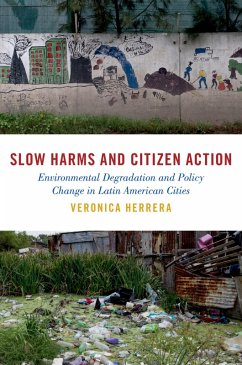Environmental degradation is not new, yet the impact of pollution on human health and wellbeing is growing. According to the World Health Organization, 12.6 million people die annually from living or working near toxic pollution, amounting to one-quarter of global deaths. Ninety-two percent of these deaths occur in middle or low-income countries, where the majority of the global population lives. For the millions of communities around the world where pollution is a slow moving, long-standing problem, residents born into toxic exposure often perceive pollution as part of the everyday landscape, particularly in low-resource settings. Local communities may also be both victims of pollution and complicit in perpetrating it themselves. When and how do people mobilize around slow harms? Moreover, when does citizen action around slow harms unlock policy action? In Slow Harms and Citizen Action, Veronica Herrera chronicles the struggle against toxic exposure in urban Latin America. Comparing advocacy movements for river pollution remediation in the capital regions of Argentina, Colombia, and Peru, Herrera explains how citizen-led efforts helped create environmental governance through networks that included impacted communities (bonding mobilization) and resourced allies (bridging mobilization). Through bonding and bridging mobilization, citizen advocacy for slow harms activated the state's regulatory capacity. Moreover, Herrera illustrates how the most successful environmental movements occurred in settings where established human rights movements had previously helped dismantle state-sponsored militarized violence. By unpacking human rights movements as thoroughfares for environmental activism, Slow Harms and Citizen Action sheds new light on the struggles for environmental justice in Latin America.
Dieser Download kann aus rechtlichen Gründen nur mit Rechnungsadresse in A, B, BG, CY, CZ, D, DK, EW, E, FIN, F, GR, HR, H, IRL, I, LT, L, LR, M, NL, PL, P, R, S, SLO, SK ausgeliefert werden.


